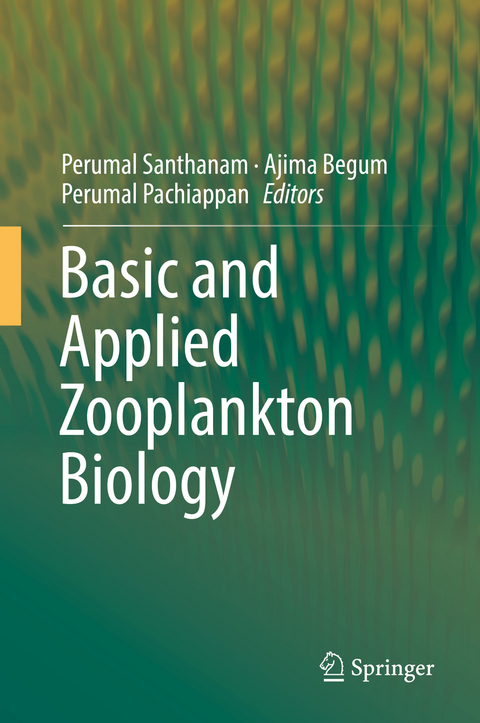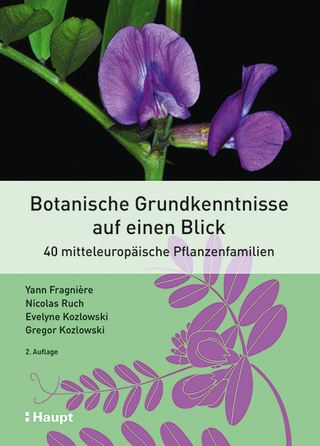
Basic and Applied Zooplankton Biology
Springer Verlag, Singapore
978-981-10-7952-8 (ISBN)
Furthermore, trillions of tiny copepods produce countless faecal pellets contributing greatly to the marine snow and therefore accelerating the flow of nutrients and minerals from the surface waters to the seabed. They are phylogenetically highly successful groups in terms of phylogenetic age, number of living species and success of adaptive radiation. A study of the basic and applied aspects of zooplankton would provide an index of the fishery potential and applications, offering insights into ocean ecology to safeguard food supplies and livelihoods of the millions of people living in coastal areas. For this reason, we need to understand all the facets of zooplankton as well as their interactions with atmosphere and other life forms, including human. In this context, this book discusses the basic and applied aspects of zooplankton, especially taxonomy, mosquitocidal activity, culture, analysis of nutritional, pigments and enzyme profile, preservation of copepods eggs, bioenrichment of zooplankton and application of zooplankton in sustainable aquaculture production, focusing on novel biofloc-copefloc technologies, and the impact of acidification and microplastics on zooplankton.
Offering a comprehensive overview of the current issues and developments in the field of environmental and commercial applications, this book is a valuable resource for researchers, aquaculturists, environmental mangers wanting to understand the importance of zooplankton and develop technologies for the sustainable production of fish and other commodities to provide food and livelihoods for mankind.
Dr. P. Santhanam is an assistant professor at the Department of Marine Science, School of Marine Sciences, Bharathidasan University, Tiruchirappalli, Tamil Nadu, India. He obtained his M.Sc, M. Phil and Ph.D Degrees in Marine Biology, from the C.A.S. in Marine Biology, Annamalai University. He has over 19 years of research and 11 years of teaching experience with over 130 publications in national and internationally respected journals, books and proceedings. He specializes in the areas of marine planktonology & aquaculture with reference to biodiversity, taxonomy, biology and culture of phyto and zooplankton for fish larviculture. He has successfully completed 5 major research projects funded by UGC, DST, DBT & SERB (Govt. of India) and is currently involved in 2 major research projects funded by the UGC & MoEF& CC (Govt. of India). He is a member in several scientific bodies and has served as an editorial board member for over 5 journals and as a reviewer for over 25 leading national and international journals. He received the DST Young Scientist Award in 2007, KTSTM Trust Best Researcher Award, and the Prof. Dr. M. Aruchami Award from Kongunadu Arts & Science College & Dr. M. Aruchami Research Foundation for his extraordinary contribution to Indian live-feed aquaculture, especially copepod. He has been expert-member of various committees. Mrs. Ajima Begum is currently an assistant professor at the Department of Botany, Tihu College, Tihu, Nalbari, Assam, India. Before joining in Tihu College, she worked as an assistant professor at B. N. College, Dhubri, Assam. She also served as a research investigator at NIRD-NERC, in the project entitled “Training-cum-Documentation for Establishing Rural Industries of Medicinal and Aromatic plants in North Eastern Region”. She has published over 10 research articles in leading national and international journals and participated in more than 6 national and international level trainings, conferences and seminars. Dr. P. Perumal is a professor & head of the Department of Biotechnology, Periyar University, Salem, Tamil Nadu, India. Prior to his appointment at Periyar University, he was a faculty research associate, lecturer, reader and professor at the C.A.S. in Marine Biology, Annamalai University, where he received his Ph. D., Degree in 1989. He is also passed the UGC-National Educational Test in 1985. He has over 30 years of research experience with about 150 publications to his credit. His research interests include molecular taxonomy and live-feed aspects of plankton, fish larviculture and antibiotic principles/drugs from marine bioresources. He has successfully completed many major research projects funded by ICAR, MoES, DRDO, UGC (Govt. of India) and is currently co-ordinating the DST-FIST programme. He is a member of the Academic Council, Senate, Board of Research Studies, chairman of PG-Board of Studies in Biotechnology & Bioinformatics (of Periyar University) and a member of the Board of Studies at various colleges and universities. He was the chairman of the Periyar University Institutional Animals Ethical Committee & co-ordinator of the Periyar University Patent Facilitation Centre & Industrial MOU, an expert-member of the European Commission (EC) Projects Review committee, scientist member of Govt. Mohan Kumaramangalam Medical College Institutional Animal Ethics committee and Scientific Advisory committees. He is also a reviewer/editor for several national & international journals.
A Method of Collection, Preservation and Identification of Marine Zooplankton.- Seasonal composition and diversity of copepods from Muthupet mangrove wetland ecosystem, Southeast coast of India.- DNA barcoding of copepods.- A method of Bio-efficacy Potential of Zooplankton (Copepod) for the Control of Vector Mosquitoes.- Techniques in collection, preservation and morphological identification of freshwater zooplankton.- A technique on the culture and preservation of marine copepod eggs.- Introduction to Artemia culture.- An optimization of culture conditions on Nannocalanus minor (Copepoda: Calanoida).- A method of estimation of enzymatic activity of copepods.- A study on assessing the feeding, survival, fecundity and post embryonic development of zooplankton Nitocra affinis (Copepoda: Harpacticoida).- Evaluation of suitability of marine copepods as an alternative live feed in high health fish larval production.- Assessing the efficacy of marine copepods as an alternative first feedfor diseases resistant shrimp larval production.- Biofloc-Copefloc: A novel technology towards the sustainable shrimp Farming.- A method of bioenrichment of plankton.- Intensive culture, biochemical composition analysis and use of zooplankton Tisbe sp. (Copepoda: Harpacticoida) as an alternative live feed for shrimp larviculture.- A method of analysis of pigments in copepods.- An intensive culture techniques of marine copepod Oithona rigida (Dioithona rigida) Giesbrecht.- A microcosm study on the impact of acidification on feeding, survival, nauplii production rate, post embryonic development and nutritional composition of marine copepod.- The Impact of Microplastics on Marine Copepods.
| Erscheinungsdatum | 21.09.2018 |
|---|---|
| Zusatzinfo | 83 Illustrations, color; 234 Illustrations, black and white; X, 442 p. 317 illus., 83 illus. in color. |
| Verlagsort | Singapore |
| Sprache | englisch |
| Maße | 155 x 235 mm |
| Themenwelt | Naturwissenschaften ► Biologie ► Botanik |
| Naturwissenschaften ► Biologie ► Limnologie / Meeresbiologie | |
| Naturwissenschaften ► Biologie ► Ökologie / Naturschutz | |
| Naturwissenschaften ► Biologie ► Zoologie | |
| Naturwissenschaften ► Geowissenschaften ► Hydrologie / Ozeanografie | |
| Technik ► Umwelttechnik / Biotechnologie | |
| Schlagworte | Animal biotechnology • Aquaculture • environmental biotechnology • Planktology • Plant Biotechnology |
| ISBN-10 | 981-10-7952-8 / 9811079528 |
| ISBN-13 | 978-981-10-7952-8 / 9789811079528 |
| Zustand | Neuware |
| Informationen gemäß Produktsicherheitsverordnung (GPSR) | |
| Haben Sie eine Frage zum Produkt? |
aus dem Bereich


